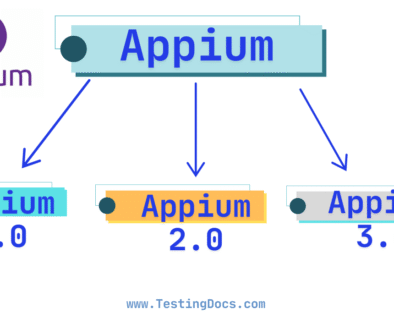Appium Features
Appium Features
Appium is an open-source, cross-platform test automation framework for native, hybrid, and mobile web applications. It supports automation on iOS, Android, and Windows (via Windows Driver).
Some of the key features of Appium are as follows:
Cross-Platform Support
- Supports iOS, Android, and Windows (desktop and mobile).
- Write tests once and run them across platforms with minimal changes.
Language & Framework Agnostic
- Supports multiple programming languages:
- Java, Python, JavaScript (Node.js), Ruby, C#, PHP, etc.
- Works with popular test frameworks like:
- JUnit, TestNG, pytest, Mocha, RSpec, NUnit, etc.
No App Modification Required
- Does not require recompilation of the app.
- Works with real apps (
.apk,.ipa) as-is—no need to embed extra libraries.
Uses Standard WebDriver Protocol
- Built on the W3C WebDriver specification (same protocol used by Selenium).
- Enables easy transition for Selenium users to mobile automation.
Support for Multiple App Types
- Native apps: Built using platform-specific SDKs (e.g., Swift/Kotlin).
- Hybrid apps: Contain webviews wrapped in a native container (e.g., Cordova/React Native).
- Mobile web apps: Websites accessed via mobile browsers (Chrome, Safari).
Real Devices & Emulators/Simulators
- Can run tests on:
- Real physical devices
- Emulators (Android)
- Simulators (iOS)
Inspector Tool (Appium Inspector)
- GUI tool to inspect app elements, record actions, and generate locators.
- Helps in identifying UI elements and their properties (e.g.,
id,xpath,accessibilityId).
Parallel Test Execution
- Supports running multiple sessions in parallel (with proper infrastructure like Selenium Grid or cloud services).
Integration with CI/CD Pipelines
- Easily integrates with Jenkins, GitLab CI, GitHub Actions, CircleCI, etc.
Cloud Testing Support
- Works seamlessly with cloud-based device farms:
- BrowserStack, Sauce Labs, AWS Device Farm, Firebase Test Lab, etc.
Gestures & Mobile-Specific Actions
- Supports advanced mobile interactions:
- Tap, swipe, scroll, pinch, zoom, long press, etc.
- Access to device functions: GPS location, network speed, orientation, biometrics, etc.
Extensible Architecture
- Modular design with drivers for each platform:
- UiAutomator2 (Android)
- XCUITest (iOS)
- Windows Driver (for Windows apps)
- Can be extended via plugins or custom drivers.
Open Source & Active Community
- Freely available under the Apache 2.0 license.
- Large, active community with regular updates and support.
Session Management
- Each test runs in an isolated session with customizable desired capabilities (e.g., platform version, device name, app path).
Example Use Case
from appium import webdriver
desired_caps = {
"platformName": "Android",
"deviceName": "Pixel_4",
"app": "/path/to/app.apk",
"automationName": "UiAutomator2"
}
driver = webdriver.Remote("http://localhost:4723/wd/hub ", desired_caps)
driver.find_element_by_id("com.example.app:id/login_button").click()
driver.quit()Appium’s flexibility, open-source nature, and alignment with WebDriver standards make it one of the most popular choices for mobile test automation.
